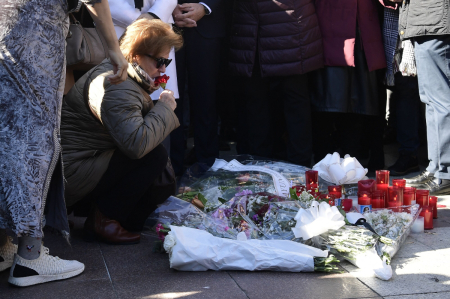Spain church attack suspect saw 'the devil,' spoke of witchcraft and magic, roommate says

The Moroccan man who allegedly stormed two Spanish churches in the southern port city of Algeciras on Wednesday, killed a church official and wounded a priest with a machete allegedly thought a stuffed animal was "the devil" and spoke of witchcraft in the weeks leading up to the attack, according to one of his roommates.
Police have identified the accused as a 25-year-old man with "no prior criminal or terrorism convictions in Spain or allied countries" and was not under surveillance although a deportation procedure was "opened in June," AFP quoted an interior ministry official as saying.
The international newswire reports the suspect, who attacked San Isidro Church and Nuestra Senora de La Palma Church in downtown Algeciras, lived near those churches. His name is Yasine Kanjaa, according to reports.
The Spanish daily newspaper El Pais spoke with a roommate who noticed disturbing developments in Kanjaa's behavior in the days and weeks leading up to the attack.
The roommate, identified by the newspaper only by the name Muhammad, is one of seven who lived with the suspect in a squatter home. Pointing to a light blue teddy bear, Muhammad told the newspaper that Kanjaa "claimed that was the devil."
Muhammad doesn't believe Kanjaa had any connection to Islamic radicals or groups.
"He is a paranoid person; it is not jihadism," Muhammad was quoted as saying. "He threatened his own roommates with a knife. That kid is unwell; he used drugs, then he quit and started to pray."
Kanjaa is from Oued El Marsa, a town on the northern coast of Morocco. He moved to the first floor of the squatter home after receiving expulsion orders from the Spanish government. The roommate recalled him as a "normal" person who dealt drugs and "smoked joints." But about two months ago, Muhammad noticed he began to change as he stopped doing drugs.
Muhammad said he began speaking often about things like magic, witchcraft and demons, shouting phrases like "there is no god but Allah" in Arabic. The newspaper notes that two mosques in the city confirmed that they had not seen Kanjaa in their facilities, and Muhammad doesn't recall him reading jihadi propaganda.
"He didn't want some of us to drink alcohol, or for others to have a girlfriend without getting married first. It got worse; one of the kids got scared and left: two weeks ago, he threatened to kill us all," Muhammad said.
Witnesses heard the suspect shout "Allahu Akbar" and "death to Christians" as he attacked the churches, according to The Telegraph.
The Spanish government has not said if it was a terror attack, although the country's top criminal court has launched a terror investigation.
Interior Minister Fernando Grande-Marlaska stated that it was not yet possible to determine if the incident had a "terrorist nature," saying there were "no third parties involved" in the attack.
The verger who was killed in the attack has been identified as Diego Valencia, who was in his 60s. According to reports, he was first injured inside the church, but fled outside in an attempt to escape the attacker. However, the attacker pursued him into the square and killed him.
On Friday, red candles and bunches of flowers were placed at the location where the church official was killed before a mass was held and the verger's coffin was taken away in a hearse, AFP reports.
The wounded priest, 74-year-old Antonio Rodríguez, underwent neck surgery and has since been released from the hospital.
After the attack, Francisco Garcia, secretary general of Spain's Episcopal Conference, expressed "great pain."
"These are sad times of suffering; we are united by the pain of the victims' families and for the Cadiz Diocese," he stated, as quoted by Reuters.
Across Europe, hate crimes against Christians have escalated in recent years. According to a report released last fall by the Observatory on Intolerance and Discrimination Against Christians in Europe, there were over 519 incidents classified as hate crimes against Christians in 2021, with 30 occurring in Spain.
Christian and Muslim organizations in Spain have condemned the attacks. Spain's Vox Party reportedly blamed the government's allegedly lax immigration policies.
Last October, the Migration Policy Institute published a report describing Spain as "one of Europe's largest migrant destinations," as approximately 7.3 million of its residents were immigrants.
"[R]esponsibility for immigrant integration has largely been handed to Spain's 17 autonomous communities, which enjoy wide authority as result of the country's devolved political system," noted the report. "Matters relating to asylum, border control, and legal status are exclusive to the national government, but policies key to integration — including social services, housing, and employment — have been granted to subnational governments."





















